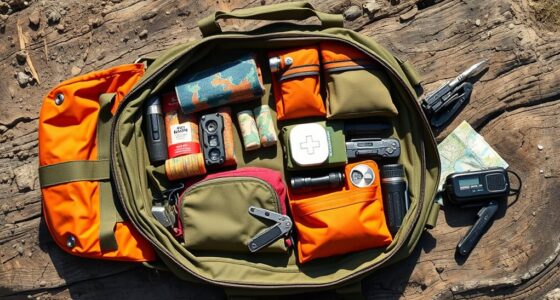When stockpiling medications, you need to know your regional laws on limits, prescriptions, and safe storage practices. Keep documentation, work closely with your healthcare provider, and store meds in a cool, dry place away from sunlight to maintain their effectiveness. Always check expiration dates and use proper disposal methods for expired drugs. Be aware of border regulations and avoid unapproved medications. If you’re interested in more details, there’s important information to contemplate for safe and legal stockpiling.
Key Takeaways
- Verify regional laws and regulations to ensure legal stockpiling limits and restrictions are followed.
- Store medications properly in a cool, dry place, and monitor expiration dates regularly.
- Maintain official prescriptions and documentation to demonstrate legal possession and facilitate refills.
- Collaborate with healthcare providers to request larger quantities or multiple refills within legal boundaries.
- Dispose of expired or unused medications responsibly through authorized disposal programs to protect health and environment.
Understanding the Legal Framework for Medication Stockpiling

Understanding the legal framework for medication stockpiling is essential to guarantee you’re complying with laws and avoiding potential penalties. Pharmacy regulations govern how medications are stored, dispensed, and transferred, so knowing these rules helps you avoid violations. You should also consider your health insurance policies, as they often have specific guidelines about medication quantities and renewals. Some insurance plans limit the number of prescriptions you can fill at once or require regular doctor visits to justify additional stockpiling. Failing to abide by these regulations can lead to denied claims or legal issues. Staying informed about pharmacy regulations and your health insurance coverage ensures you stockpile safely, legally, and without risking your access to necessary medications. Additionally, understanding medication regulations can help you navigate potential restrictions and ensure your stockpile remains compliant.
Which Medications Can Be Safely Stockpiled?

Certain medications are generally safe to stockpile when you have proper authorization and storage conditions. Over-the-counter options like pain relievers, antihistamines, and antacids are practical to keep on hand. These medications can help manage minor health issues during emergencies. However, consider your medication allergies before stockpiling to avoid adverse reactions. The table below highlights some common OTC meds suitable for stockpiling:
| Medication Type | Common Examples | Notes |
|---|---|---|
| Pain Relievers | Acetaminophen, Ibuprofen | Check expiration dates regularly |
| Allergy Medications | Antihistamines, Decongestants | Confirm no medication allergies |
| Digestive Aids | Antacids, Laxatives | Store in a cool, dry place |
It is also important to be aware of cultural practices related to medication use in different communities to ensure respectful and effective health management. Additionally, glycolic acid is used in skincare routines to promote skin renewal and improve texture, which can be beneficial for overall skin health. Incorporating knowledge of storage conditions can help in maintaining medication effectiveness over time. Proper medication expiration management is crucial to ensure safety and efficacy. Always consult your healthcare provider to guarantee these options meet your needs. Furthermore, understanding the financial impact of medical supplies can help you plan more effectively for long-term health management.
Prescription Requirements and Documentation

Do you know what documentation you need to legally stockpile prescription medications? To stay compliant, you must keep proper pharmacy paperwork, such as official prescriptions and refill records. When obtaining prescription refills, ensure your healthcare provider authorizes the medication and that the pharmacy documents each refill accurately. It’s important to have a copy of your current prescription, especially if you’re stockpiling for emergencies. Some jurisdictions require written prescriptions for certain medications, while others accept electronic records. Always verify that your pharmacy’s paperwork clearly states the medication, dosage, and prescribing doctor’s details. Proper documentation not only helps you avoid legal issues but also ensures your medication supply remains legitimate and accessible when needed. Additionally, maintaining accurate medical records is essential for verifying your medication history and complying with health regulations. Ensuring your medication storage practices meet safety guidelines can also prevent accidental misuse or contamination. Being aware of local pharmacy laws can further help in adhering to regional regulations regarding medication stockpiling.
Storage Guidelines to Maintain Medication Efficacy

To guarantee your medications stay effective, proper storage is essential. You should keep medications in a cool, dry place away from direct sunlight, as heat and moisture can degrade their potency. Always follow the storage instructions on the label, especially regarding temperature requirements. Use airtight containers when necessary to prevent exposure to humidity. Regularly check your stock for signs of deterioration, such as discoloration or changes in texture. Effective medication storage supports shelf life management by extending the usability of your supplies and reducing waste. Avoid storing medications in the bathroom or near sinks where humidity and temperature fluctuations are common. Proper storage ensures your medications remain safe and effective until you need them, making your stockpile more reliable and efficient. Additionally, understanding medication stability can help you select optimal storage conditions to preserve their effectiveness over time. Being aware of storage guidelines tailored to each medication type can further enhance their longevity and potency, especially when considering factors like temperature sensitivity. Proper storage practices are crucial for maintaining the quality of your medications, ensuring they provide the intended health benefits when needed.
Managing Expiration Dates and Safe Disposal

You need to keep track of your medications’ expiration dates to guarantee they remain safe and effective. When medications expire, it’s important to dispose of them properly to protect yourself and the environment. Learning the right disposal methods helps prevent misuse and environmental contamination. Using proper disposal techniques ensures that expired medications do not pose risks to others or harm the ecosystem. Additionally, understanding industry trends in medication disposal can keep you informed about the safest and most current practices.
Monitoring Medication Lifespan
Monitoring medication lifespan is essential to guarantee safety and effectiveness. Regular expiration monitoring helps you track medication shelf life and prevents using expired drugs. Keep a record of purchase dates and check labels monthly. When medications near their expiration, consider replacing or verifying their potency. Use the following table to help manage your stock:
| Medication Type | Shelf Life & Notes |
|---|---|
| Over-the-counter | Usually 1-3 years, check labels |
| Prescriptions | Varies; renew before expiry |
| Supplements | Typically 1-2 years, store properly |
Additionally, understanding AP Tuning techniques can help optimize the performance and longevity of your vehicle’s components, similar to how proper medication management ensures safety and effectiveness. Regularly reviewing your medication stock also minimizes health risks associated with expired drugs. Proper storage conditions, such as keeping medications in a cool, dry place, can also extend their shelf life and efficacy. Proper storage practices are crucial to maintaining medication potency over time. Implementing consistent storage practices and monitoring expiration dates can further prevent wastage and ensure safety.
Proper Disposal Methods
When medications reach their expiration date, it’s important to dispose of them properly to prevent potential health and environmental risks. Flushing drugs or throwing them in the trash can harm water sources and contribute to hazardous waste issues. Instead, consider medication recycling programs or authorized disposal sites. Many pharmacies or community take-back programs offer safe disposal options for expired or unused medications. Never pour medications down the drain unless specifically instructed, as this can contaminate water supplies. Proper disposal not only protects your family but also minimizes environmental impact. Check local regulations and guidelines for disposal methods, ensuring you’re following legal procedures. By handling expired medications responsibly, you reduce risks associated with misuse and environmental contamination. Additionally, understanding proper disposal practices can help prevent accidental poisoning and promote community health. Proper disposal also involves understanding the types of cookies used on related websites to protect your privacy during these processes.
Quantity Limits and Personal Use Regulations

To prevent medication misuse and guarantee safety, many regulations establish limits on the quantity of drugs individuals can stockpile for personal use. These rules set dosage limits and specify refill protocols to ensure responsible medication management. You might encounter restrictions such as:
- A maximum supply of a 30-day or 90-day medication stockpile
- Limits on the number of refills allowed without new prescriptions
- Restrictions on storing large quantities in your home
These regulations help prevent overuse and ensure medications are used as intended. Proper knowledge of these regulations keeps your medication use responsible and within legal boundaries. Additionally, understanding regulatory frameworks can help you stay informed about changing policies affecting medication storage and distribution. Knowing about appliance maintenance plans can also help prevent unexpected issues with medical devices or home appliances related to medication storage areas.
Transporting Medications Across State and International Borders

Once you’ve established proper medication management at home, understanding the rules for transporting drugs across borders becomes equally important. You need to familiarize yourself with border regulations, which vary by country and state. In some cases, legal exemptions apply for personal use medications, allowing you to carry a reasonable supply without penalty. Always carry prescriptions or doctor’s notes to verify your medications’ legality and purpose. Check specific border regulations beforehand, as they may restrict certain drugs or require documentation. When crossing international borders, be aware that customs officials may inspect your medications, so having proper documentation is essential. Remember, even with legal exemptions, exceeding personal limits or carrying restricted substances can lead to confiscation or legal trouble. Stay informed to guarantee smooth and legal transport of your medications.
Recognizing and Avoiding Illegal or Unapproved Drugs

Recognizing illegal or unapproved drugs is essential to safeguarding your health and avoiding legal trouble. You must be vigilant when evaluating medications, as illegal drugs and unapproved medications can sometimes appear legitimate. Look out for warning signs such as suspicious packaging, unfamiliar supplier sources, or lack of proper labeling. Be cautious if the medication’s claims sound too good to be true or if it’s offered at considerably lower prices. Always verify whether a drug is approved by regulatory agencies like the FDA. Avoid purchasing medications from unverified online sources or foreign markets. Remember, illegal drugs and unapproved medications pose serious health risks and legal consequences. Staying informed helps you make safe choices and protects your wellbeing from the dangers associated with unapproved or illicit substances.
How to Work With Healthcare Providers for Stockpiling

To effectively work with your healthcare provider on stockpiling medications, you need to clearly communicate your needs and reasons. It’s also important to understand their prescription policies and any limits they may have. Open conversations help make sure you get the medications you require while staying within proper medical guidelines.
Communicate Medication Needs
How can you guarantee your healthcare provider understands your need to stockpile medications? The key is clear medication communication and fostering an honest patient-provider dialogue. Be upfront about your reasons for stockpiling, whether it’s for emergencies or ongoing health concerns. When discussing this, imagine:
- Sitting across from your provider, confidently explaining your plans
- Handing over a written list of medications and quantities you want to stock
- Asking specific questions about prescription limits and refill policies
Understand Prescription Policies
Understanding your healthcare provider’s prescription policies is essential for effectively stockpiling medications. Pharmacy policies and prescription limits vary, so knowing these rules helps you plan ahead. Some providers may have restrictions on how many refills they authorize or limit the quantity you can receive at once. To avoid issues, communicate your needs clearly and discuss your intention to stockpile. Ask whether they’re willing to write prescriptions with larger quantities or provide multiple refills. Be aware of pharmacy policies that might restrict how much medication you can obtain at one time. Building a good relationship with your healthcare provider and understanding their policies makes it easier to manage your medication supply without violating regulations or risking shortages. Being informed ensures you can stockpile responsibly and legally.
Preparing for Emergencies: Practical Tips and Best Practices

Preparing for emergencies involves more than just having a plan; it requires practical steps to guarantee you’re ready when chaos strikes. Effective emergency planning includes organizing your medications with proper medical storage, so they stay safe and effective. Keep a well-stocked kit with essential supplies, including extra prescriptions and over-the-counter medicines. Regularly check expiration dates and rotate stock to ensure everything is usable. Consider creating a dedicated space for emergency supplies, making accessibility quick and easy. Visualize a stash of sealed bottles, labeled containers, and a checklist to monitor your inventory. These simple steps help you stay prepared, minimize stress during crises, and ensure your health needs are met no matter the situation.
Frequently Asked Questions
Can I Legally Stockpile Medications Without a Prescription?
You can’t legally stockpile medications without a prescription, as most drugs require a legal purchase through a healthcare provider. Doing so risks purchasing expired or unsafe medications, which may have passed their expiration date, reducing effectiveness. Always follow legal guidelines and consult your doctor for legitimate prescriptions. Proper storage and regular medication review guarantee safety, and never buy medications from unverified sources to avoid legal trouble or health risks.
Are There Specific Storage Conditions for Temperature-Sensitive Drugs?
Imagine storing insulin that requires refrigeration. You need to maintain strict temperature control to guarantee medication stability. For temperature-sensitive drugs, keep them in a cool, dry place away from direct sunlight, ideally between 68-77°F (20-25°C). Using a dedicated medication fridge or insulated container helps prevent temperature fluctuations. Proper storage preserves drug efficacy, reduces waste, and ensures safety when you need these medications most.
How Often Should I Review and Update My Medication Stockpile?
You should review and update your medication stockpile at least every six months. Regular reviews help you monitor medication expiration dates and guarantee your stockpile inventory management stays current. This way, you can replace expired drugs, avoid waste, and keep your supplies ready for emergencies. Staying proactive ensures your medications remain safe and effective, giving you peace of mind knowing your stockpile is reliable and well-maintained.
What Are the Penalties for Possessing Unapproved Medications?
Imagine the shock if you’re caught with unapproved medications. You might face serious legal consequences due to strict medication regulations. Authorities take this seriously, and penalties can include hefty fines or even jail time. The risk isn’t worth it—possessing unapproved meds breaches legal standards for safety and efficacy. Always guarantee your medications comply with regulations to avoid these dangers and protect your health and freedom.
Can I Donate Excess Medications to Charities or Clinics?
You might wonder if you can donate excess medications to charities or clinics. While medication donation can help those in need, you must follow charity guidelines and legal requirements. Always verify if the organization accepts medications, ensure they’re unopened and properly labeled, and consult local laws. Donating responsibly helps prevent misuse and guarantees your medication donation benefits those who need it most, without legal complications.
Conclusion
By thoughtfully planning your medication stockpile, you’re quietly building a safety net for uncertain times. Staying informed about legalities and best practices helps you avoid unintended pitfalls, ensuring your efforts are both responsible and effective. Remember, true preparedness isn’t just about having supplies—it’s about peace of mind and knowing you’re ready to face life’s little surprises with confidence. In the end, a well-managed reserve becomes your silent guardian in moments when you need it most.










